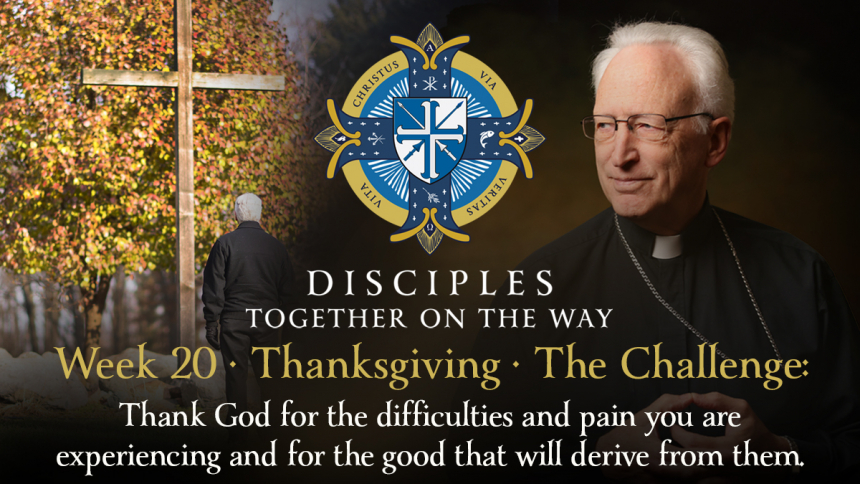
May 20, 2022
Dear Sisters and Brothers in the Lord,
As disciples together on the Way, this week we are continuing to explore the theme of Thanksgiving. In fact, as odd as it may sound, our challenge for this week focuses on thanking God for some difficulty we are experiencing in life and for the potential good that can come from it.
As the 20th century Spanish priest, Saint Josemaría Escrivá, once wrote: “If things go well, let us rejoice, blessing God who makes them prosper. And if they go badly? Let us rejoice, blessing God who allows us to share in the sweetness of his Cross.” But how do we do that? Let’s find out.
None of us much enjoy suffering or even the thought of it. Our present-day culture tends to reject suffering and flees from trials. Hence, the Church’s teaching on the potentially transformative power of suffering can prove difficult for many to understand or accept.
It was ever thus. As Saint Paul wrote to the 1st century Church in Corinth: “We preach Christ crucified, a stumbling block to Jews and folly to Gentiles.” (1 Corinthians 1:23)
The French Trappist mystic of the late 19th, early 20th century, Dom Vital Lehodey, says this:
“After the triumph of Palm Sunday, our Lord was betrayed, arrested, abandoned, denied, judged, condemned, buffeted, scourged, crucified, robbed of His reputation…Hell was triumphant, and all seemed lost. Nevertheless, it was precisely through this apparent defeat that Christ victoriously achieved our salvation.”
Now, you may be thinking: “But Bishop, I am not Jesus, what do my difficulties and sufferings have to do with this?” Well, part of the Good News of Our Lord is that the suffering of Christ also raised human suffering to the level of redemption.
One man who knew much about suffering was Pope Saint John Paul II. The eight year old Karol Józef Wojtyła in Poland in 1920 suffered the death of his mother due to heart and kidney failure. His only sister, Olga, died in infancy before he was born. His only brother, Edmund, succumbed to scarlet fever when Karol was 12. His father then died of a heart attack in 1941. Thus, as he wrote later in life, “At twenty, I had already lost all the people I loved.”
Throughout his adult life too, Pope John Paul’s litany of suffering continued to unfold: Nazi occupation; Communist persecution; An attempted assassination; and years of ill health including, latterly, Parkinson’s Disease. And yet in his 1984 Apostolic Letter of human suffering, Salvifici Doloris, he tells us this:
“The Redeemer suffered in place of man and for man. Every man has his own share in the redemption. Each one is also called to share in that suffering through which the redemption was accomplished. He is called to share in that suffering through which all human suffering has also been redeemed. In bringing about the redemption through suffering, Christ has also raised human suffering to the level of redemption. Thus, each man, in his suffering, can also become a sharer in the redemptive suffering of Christ.”
Here we have a perfect reason to give thanks for our trials. If we lovingly offer any difficulty to our crucified Christ, we will be joining Him in His plan of salvation. This will bring the fruits of salvation to the living or the dead.
We can even nominate a particular intention or person for whom you are offering up your suffering, such as a young person being tempted with suicide; a husband and wife on the verge of divorce; or a soul in purgatory. Within the divine economy, the prayer of one who suffers in union with Christ is a strong currency indeed.
Let me end on one final quotation. It comes from the 16th century Spanish mystic, Saint Teresa of Ávila who relates that Our Lord himself said the following to her:
“Look at my whole life, full of suffering, and be persuaded that they whom my Father loves most dearly shall receive from Him the heaviest crosses. The measure of His love is also the measure of the suffering He sends. How could I better prove My affection for you than by desiring for you that which I desired for Myself?”
With this in mind, my challenge this week is twofold: First, thank God for some particular difficulty or pain or burden you are experiencing in life and for the good that, we believe, God will derive from it. Second, offer the Sunday Mass in thanksgiving for the difficulties.
See you next week and be assured of my prayers for you. Until then, may God bless you in the name of the Father and of the Son and of the Holy Spirit. Amen.
Yours in Christ,
+ Earl Boyea
Bishop of Lansing
